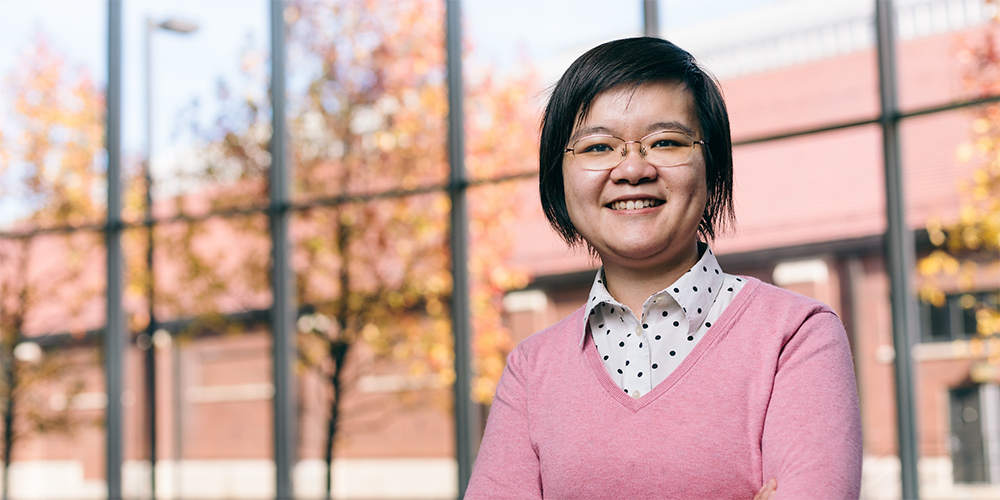Yin earns NSF CAREER award
05-29-2024

Assistant Professor Ming Yin wins an NSF CAREER Award for her work, “Redesigning the Human-AI Interaction Paradigm for Improving AI-Assisted Decision Making.”
Addressing Engagement Gaps: Optimizing Human-AI Collaboration
Amidst the quick rise in artificial intelligence (AI) based decision aids across finance, law enforcement, education, and cybersecurity sectors, a critical issue persists: the gap in collaborative performance between ideal human and AI interactions–which outperforms either humans or AI alone. This gap, primarily rooted in insufficient engagement between individuals and AI systems, poses significant challenges to effective decision-making processes. As decision makers struggle to fully engage with AI advice, this project unveils a pivotal initiative aimed at fostering robust engagement strategies, addressing trust issues, and optimizing human-AI collaboration across diverse industries.
Ming Yin, assistant professor in the Department of Computer Science won a National Science Foundation (NSF) CAREER award for her proposed work titled, “Redesigning the Human-AI Interaction Paradigm for Improving AI-Assisted Decision Making.” Her project explores innovative approaches to enhance human-AI collaboration in decision-making by developing and evaluating three novel interaction paradigms: Human-Reflective AI, Human-Adaptive AI, and Human-Behavior-aware AI.
“This research aims to address the shortcomings of current AI-based decision aids through explicitly designing AI to cultivate and optimize the engagement of decision makers,” said Yin. She added, “Ultimately this research intends to improve decision-making performance across various sectors that use AI-based decision aids.”
Empowering Human-AI Collaboration Dynamics
This project develops and evaluates three novel human-AI interaction paradigms: (1) Human-Reflective AI interaction, in which AI is designed to increase the decision makers' engagement level by guiding them to critically reflect on the decision process; (2) Human-Adaptive AI interaction, in which AI assistance will be presented in a personalized manner to nudge decision-makers into appropriately engaging with the AI recommendations; and (3) Human-Behavior-aware AI interaction, in which AI is trained to anticipate decision-makers' engagement behavior and optimize for the human-AI team performance.
Goals of the project
Yin aims to develop new AI-based decision aids that actively encourage human engagement, and take into account humans’ suboptimal yet individually different engagement behaviors. In doing so, Yin will establish new scientific knowledge about ways to incorporate cognitive factors of decision-makers, including their capabilities and limitations, into the designs of AI-based decision aids to best support decision-makers and increase AI-human team performance.
Emphasizing the importance of this research to society, Yin stated, "By integrating cognitive factors and tailoring interactions to decision-makers' knowledge, needs, and limitations, we envision empowering individuals across sectors to make informed, effective decisions, ultimately shaping a more resilient and efficient society."
NSF CAREER Awards
NSF CAREER awards are the organization’s most prestigious awards given to junior faculty who embody the role of teacher-scholars through research, education and the integration of those concepts within the mission of their organizations. CAREER awards support promising and talented researchers in building a foundation for a lifetime of leadership. Receiving this award reflects this project’s merit of the NSF statutory mission and its worthiness of financial support.
Ming Yin is an assistant professor in the Department of Computer Science. Her current research interests include human-AI interaction, crowdsourcing and human computation, and computational social sciences. She uses both experimental and computational approaches to examine how to better utilize the wisdom of crowd to enhance machine intelligence (i.e., crowdsourcing and social computing), and how to better design intelligent systems that people can understand, trust and engage with effectively (i.e., human-AI interaction). Yin was the Conference Co-Chair of AAAI HCOMP 2022. Her work was recognized with multiple best paper (CHI 2022, CSCW 2022, HCOMP 2020) and best paper honorable mention awards (CHI 2024, CHI 2019, CHI 2016). Yin completed her postdoctoral research at Microsoft Research New York City in 2017-2018 and earned her PhD in computer science at Harvard University in 2017.
About the Department of Computer Science at Purdue University
Founded in 1962, the Department of Computer Science was created to be an innovative base of knowledge in the emerging field of computing as the first degree-awarding program in the United States. The department continues to advance the computer science industry through research. US News & Reports ranks Purdue CS #20 and #18 overall in graduate and undergraduate programs respectively, 6th in cybersecurity, 8th in software engineering, 13th in programming languages and systems, 15th in data analytics, and 18th in theory. Graduates of the program are able to solve complex and challenging problems in many fields. Our consistent success in an ever-changing landscape is reflected in the record undergraduate enrollment, increased faculty hiring, innovative research projects, and the creation of new academic programs. The increasing centrality of computer science in academic disciplines and society, and new research activities - centered around data science, artificial intelligence, programming languages, theoretical computer science, machine learning, and cybersecurity - are the future focus of the department. cs.purdue.edu
Writer: Emily Kinsell, emily@purdue.edu
Source: Ming Yin, mingyin@purdue.edu